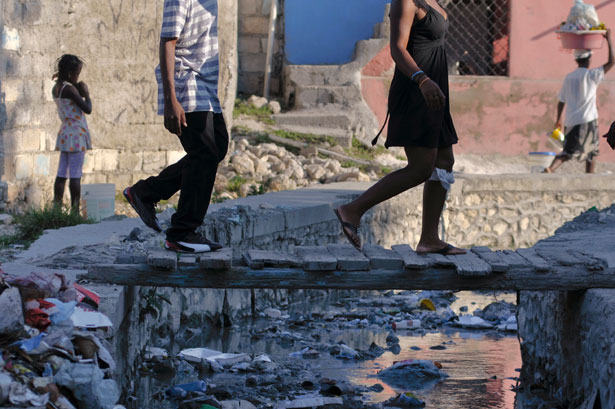
People walk across a tiny overpass as raw sewage flows beneath in an open sewage in Port-au-Prince September 4, 2012. REUTERS/Swoan Parker
I contracted cholera by the breezy beaches of Port Salut, Haiti, while attempting to escape a burnout, a broken heart and the lingering pangs of Dengue fever. Cholera’s not a whole lot different from food poisoning, and it’s no big deal if you’ve got a clean toilet, potable water, know how to treat it and aren’t malnourished.
But in Haiti, where there is no sewage system, and where access to water and sanitation is mostly privatized, cholera has been a death sentence: more than 8,000 people have died and 640,000 (and counting) made ill since the South Asian strain was imported, likely by United Nations peacekeepers from Nepal in October 2010, according to a host of scientific studies. It is now the worst cholera epidemic in modern history.
In late February, the Haitian government released its long-awaited $2.2 billion, ten-year cholera elimination plan. Just the week before, the UN had rejected a legal claim filed by more than 5,000 cholera victims seeking financial compensation, an apology from the UN for gross negligence, and a commitment to build water and sanitation infrastructure in Haiti.
Invoking immunity under the UN’s 1946 convention, the United Nations basically snubbed the claim as “not receivable” and has not apologized. Worse, it has committed itself to fund only 1 percent ($23.5 million) of Haiti’s cholera elimination plan; it recommends Haiti get the rest from the “private sector” or from “major venture philanthropist individuals,” according to Nigel Fisher, the new head of the UN peacekeeping mission in Haiti.
In a country where nearly 80 percent of people live on less than $2 a day, privatized water and sanitation access has left more than 80 percent of the population without adequate sanitation and nearly a third without potable water. Those in tent camps and shanties who can’t pay for toilets are forced to defecate into plastic bags, which end up in the nearest canal or ravine. Those who can pay avail themselves of a free-market chaos of water and waste tanker trucks, run almost entirely by the local or international NGO private sector. A sharp rise in the price of gasoline, which could easily result from a change in the PetroCaribe deal offered by Venezuela’s late president, Hugo Chávez, could quickly deepen Haiti’s water and sanitation crisis.
Haiti is one of the few countries in the world where water security has deteriorated since the Millennium Development Goals were implemented, despite a $650 million-a-year peacekeeping mission whose premise for being in a country with no war and one of the lowest homicide rates in the region is that Haiti is a “failed state.” The UN knew full well the menace cholera posed, yet the UN Development Program does not see water access as part of its “development” mandate.
Jon Andrus, deputy director of the Pan American Health Organization, agrees that the privatization of Haiti’s water and sanitation has threatened its most vulnerable people, and he concedes that PAHO and its partners “have failed for decades to reverse that situation.” Still, Andrus is optimistic about the cholera elimination plan, having seen firsthand the eradication of polio, rubella and measles in some of the poorest parts of the world.
However, on February 27, at the launch of the elimination plan, Médecins Sans Frontières communication officer Yann Libessart was not impressed by the lofty speeches, given that barely half ($238 million) the plan’s funding for the next two years has materialized. Cholera treatment centers that MSF passed on to the Haitian government are “degenerating” into “contamination zones,” he says. When asked who should fund the plan, Libessart is blunt: “The people who are responsible for the introduction of the disease into the country.”
Emergency funds for cholera dried up in January, and most NGOs have left Haiti. The funding vacuum is squeezing DINEPA, Haiti’s water and sanitation agency, and it’s putting the jobs of two dozen qualified Haitians on the chopping block.
In January, white UN sewage trucks could be seen unloading their tanks into the tailing ponds of Haiti’s first sewage treatment plant, in Morne-à-Cabrit, which opened a year and a half ago but has now been closed because of lack of funding. “It beats me up to know,” says Wilston Etienne, a DINEPA officer who oversaw the building of the treatment site, when asked why international funds to operate the plant were not forthcoming.
DINEPA aims to open eighteen treatment sites, one in each urban center, but the only way Etienne foresees this being possible is by charging $4 per cubic meter of human waste. For now, Morne-à-Cabrit remains closed. Etienne shakes his head and laments, “This site should have been something Haitians could be really proud of.”
Read Amy Wilentz’s recent reportage from Haiti, “Life Among the Ruins.”


